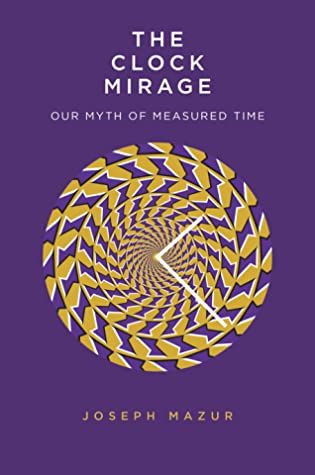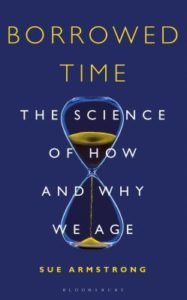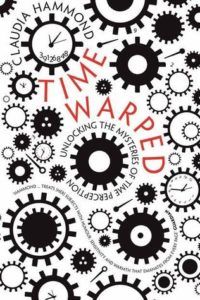You might be here because time feels bonkers for you right now, because April was one million years long and May flew by in what felt like a week. Because you’ve been staring at the walls of the same room for most of the year so far and you need to know that there’s some science behind what you’re experiencing. I’m here for you with a short list of nonfiction books about time to help you answer your questions about the science, history, and perception of time as well as a look at the science of aging and possibilities of time travel.
If you’re here for some self-care, you might also want to check out this post about time management: Manage Your Time Better With These 7 Time Management Books. If you’re here because you’re just looking to leave reality completely behind and escape into some alternate universe where time travel is real, we have that too, check out these 20 Must-Read Time Travel Books. Jeremy Bearimy, baby.
Books About Time
The Order of Time by Carlo Rovelli
Carlo Rovelli is an Italian theoretical physicist. The Order of Time gives a poetic and condensed history and explanation of the science of time, interspersing quotes from Horace’s Odes and various other philosophers and artists. I’m not a very apt student of science, but I love learning about all the failed experiments and hypotheses it takes to come up with a trusted theory and how other scientists build on the work that comes before. At 240 pages or just over four hours on audio, this short, lyrical book is a great place to start your education on time. The incomparable Benedict Cumberbatch narrates the audiobook, which really brings out the poetry of Rovelli’s writing, and his Dr. Strange accent even makes a few appearances. Perfect.
 A Tenth of a Second: A History by Jimena Canales
A Tenth of a Second: A History by Jimena Canales
It wasn’t until the 1850s that instruments could recognize a tenth of a second. A Tenth of a Second explores the history of this small measurement of time and the implications it had on modern technologies like photography, telegraphy, cinematography and beyond. Canales is a scholar of the history of science and currently on the faculty of University of Illinois-Urbana Champaign. She also has another book on the history of time: The Physicist and the Philosopher: Einstein, Bergson, and the Debate That Changed Our Understanding of Time.
 The Clock Mirage: Our Myth of Measured Time by Joseph Mazur
The Clock Mirage: Our Myth of Measured Time by Joseph Mazur
Jospeh Mazur is a Professor Emeritus of Mathematics at Marlboro College. In The Clock Mirage, Mazur asks the question “What is time?” and proceeds to take readers on a journey through the history of scientific, philosophical, and practical applications of time. Throughout, he also looks at the personal nature of time as something that lives within us by exploring the perception and effect of time on truck drivers, Olympic racers, prisoners, and clockmakers. With insights into how our technologies, our bodies, and our attitudes alter our perceptions of time, The Clock Mirage is a one-stop shop for exploring how and why time effects all of us differently. And at 272 pages or just under nine hours on audio, you can pencil this one right into your reading slot.
 Borrowed Time: The Science of How and Why We Age by Sue Armstrong
Borrowed Time: The Science of How and Why We Age by Sue Armstrong
This book isn’t really about time, but a look into the science of aging. Armstrong is a science writer and in Borrowed Time she surveys the various scientific research into aging from evolutionary biologists to geneticists and immunologists, to name a few. Her book looks into the various competing theories and controversies behind the research of aging. This overview of the science of aging and anti-aging is a great continuation into an interest in the nature of time and how it effects humans.
 Time Traveler: A Scientist’s Personal Mission to Make Time Travel a Reality by Ronald Mallett with Bruce Henderson
Time Traveler: A Scientist’s Personal Mission to Make Time Travel a Reality by Ronald Mallett with Bruce Henderson
All right, now let’s get futuristic, because if 2020 has done anything, it has made me contemplate whether time travel is a real possibility. Ronald Mallett is a theoretical physicist on the faculty at the University of Connecticut. His book Time Traveler is part memoir, part scientific exploration. Mallett discusses how the death of his father at the age of 10 sparked his interest in time travel first as a form of escapism and eventually as a field of research using Einstein’s theory of relativity as a foundation. Mallett has an inspiring life story and his work on the practical applications of science to possibly achieve time travel is fascinating.
 Time Warped: Unlocking the Mysteries of Time Perception by Claudia Hammond
Time Warped: Unlocking the Mysteries of Time Perception by Claudia Hammond
Claudia Hammond is a broadcaster, author and psychology lecturer. In Time Warped, she explores our perception of time by highlighting different experiments, theories, and stories; rounding up and explaining some of the research into time perception. The last chapter looks into practical applications of time management and changing your relationship with time.
Source : 6 Great Nonfiction Books About Time










